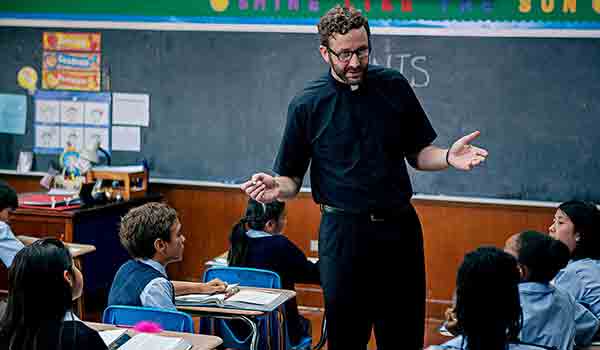I’M showing him how the world works — you work, you get paid, you drink.” Thus Vincent McKenna (Bill Murray) explains to a concerned mother his mentoring rationale for her 12-year-old son, in Theodore Melfi’s heartfelt dramedy St. Vincent.
St. Vincent is the kind of bittersweet movie for which Bill Murray’s particular comedic schtick was made. Some will justifiably claim it’s a little too saccharine for a classic slice of Murray’s specific acerbic humour. But, nevertheless, its narrative pretensions are lifted above the average mark by Murray’s idiosyncratic presence. What would have been a common gentle redemption tale carries a more cutting edge.
Despite the title, at the film’s outset Murray’s Vincent is the least likely candidate for sainthood. A crusty, grumpy, reclusive Vietnam vet, Vincent seems determined to finish the job the Viet Cong started, tripping through a labyrinth of self-destruction.
A sozzled drinker, unapologetic smoker and hopeless gambler, “Vin”, as they call him, is a maelstrom of mishap. He lives alone and seemingly has no family, though he mysteriously visits an elderly woman at a nursing home once weekly. Although he’s broke he does have a girlfriend, of sorts, a pregnant Russian hooker and stripper named Daka (an unrecognisably roughed-up Naomi Watts). As someone helpfully explains to Vincent: “You’ve gone below zero.”
Matters alter for Vincent when Maggie (Melissa McCarthy) moves in next door. A recent divorcee and struggling single mother, she needs a child-minder for her son Oliver (debutant Jaeden Lieberher), a likeable but wide-eyed ingénue. Desperately short of funds, Vincent puts himself up for the job at a cut-price rate. Desperately short of options, or simply desperate, Maggie agrees. Thus begins Oliver’s tutelage in the harsher and saltier aspects of life.
Vincent schools the impressionable lad in the seasoned milieu of racetracks and lap-dancing joints, teaching him to smoke and to box. Green-as-grass, Oliver unquestioningly absorbs everything of Vincent’s erratic behaviour, like some kind of pre-pubescent sponge. When Vincent explains that Daka is a “lady of the night”, Oliver takes this to mean she merely works the late shift (which, it might be said, is true).
 Chris O'Dowd
Chris O'DowdGradually, though, the two start to form a spring-and-autumn friendship. Each sees the other as either a surrogate grandfather or grandson. Vincent teaches Oliver to fight dirty, the better to battle against school bullies. He trains him to break an opponent’s nose with a single blow, a technique Oliver soon puts to use.
Oliver meanwhile joins the local Catholic school (even though he’s Jewish), where he’s taught by the earnestly pious Brother Geraghty (an affable but understated Chris O’Dowd). Brother Geraghty still firmly believes Catholicism is the one true faith and when he tells his class about the criteria for saintliness, Oliver begins to see Vincent as a worthy nominee for sanctification.
Now, it’s said Oscar Wilde once wickedly commented on Dickens’ Old Curiosity Shop by saying, “one would need a heart of stone to read the death of Little Nell without laughing”. This might be apocryphal, but it elegantly expresses how a storyteller’s attempt at pathos might end up arousing mockery more than melancholy.
A similar pitfall awaited Melfi with St. Vincent, which could have strayed into a swamp of treacle without Murray’s lead. Plot development demands that Vincent’s cussed carapace inevitably softens but this occurs through an authentic character arc. Indeed, Melfi claims the story is based on actual events in his own family history.
As for Murray’s family history, it’s intriguing for him to star in a narrative with even a cursory religious theme. Chicago-born Murray is from a strict Irish-Catholic household (one of nine children) and holds ambivalent feelings on matters spiritual.
He has one sister who’s a nun but harbours for himself some contradictory, even confused, religious views. He once labelled religion as “the worst enemy of mankind”, but has openly lamented the end of the traditional Latin Mass in Catholic worship. He sponsors a baseball club named the St Paul’s Saints, which holds an annual “Atheists Day” and sometimes adopts the name St. Paul’s “Aints”.
Murray shows no such ambiguity about his Irishness, however, declaring himself to have “green blood”. It’s tempting to find in his recalcitrant wit something of Behan or Beckett, wilfully defying both patrician and populist expectations. Murray’s blend of wicked wiseass and superior sarcasm has been compared to the comically-lofty Ignatius J. Reilly, John Kennedy Toole’s anti-hero in A Confederacy of Dunces.
Of course, Murray’s screen persona hit a pinnacle as Phil Connors, the aggressively arrogant weatherman in Harold Ramis’ Groundhog Day (1993). The ingenious Swiftian conceit whereby Connors relives the same day repeatedly without end sees him transformed from misanthrope to humanist. Something similar transpires along Murray’s dramatic journey in St. Vincent. It’s nowhere near the level of Groundhog Day but few comedies are in that category.
Where the movie scores highly is in its current relevance, touching on themes of struggling families, exiled immigrants and isolated elders. The cast win praise for making the characters believable, if somewhat caricatured. At the head of it all stands the imperious Murray, effortlessly elevating everything.
St. Vincent is out now in British and Irish cinemas

